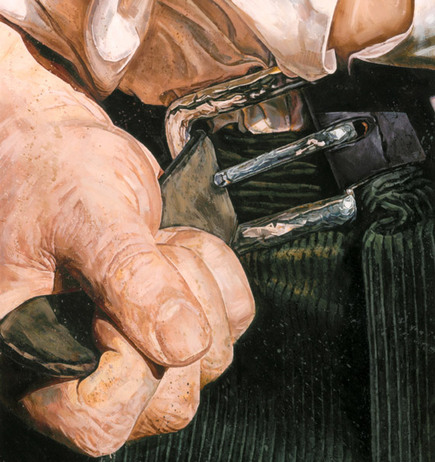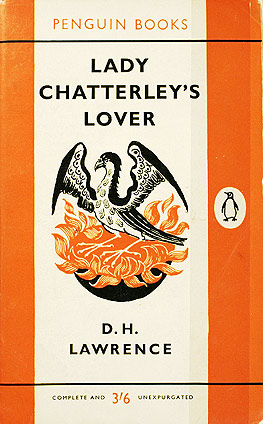You have no items in your cart. Want to get some nice things?
Go shopping
There is an urban legend that runs something like this. It’s the year two-thousand-and-something and in Ibiza, or somewhere of that ilk, a nightclub runs a competition. The prize: a surfboard. The challenge: do something obscene on stage. A seventeen-year-old girl called Constance is eager to win. With no word to her peers she strips naked and climbs on stage with a man she has plucked from the crowd. For two minutes Constance and the unknown man perform anal sex in full view of the club. There are cheers, but also groans. Constance doesn’t win the surfboard.
In 1929, the UK and US publication of D. H. Lawrence’s Lady Chatterley’s Lover was blocked on grounds of obscenity. Eighty or so years later it seems plausible that a couple could have anal sex in a public competition that urges the obscene, and not win. This is a facile comparison, perhaps. The girl in question would no doubt still be thought obscene by some, but the comparison does at least draw attention to what we perceive as obscene now and what was deemed obscene in 1929.
If there had been a surfboard up for grabs for a display of obscenity in fiction in 1929, Lady Chatterley’s Lover surely would have won. Even when it was finally published openly in 1960, it would probably have picked up the prize. It’s popularly thought of as scandalous and smutty, — high-brow pornography for the thinking pervert.
But what does the novel actually contain? What if our mythical Constance, fresh from her public failure to win a surfboard the night before, rolled out of her hotel room bed, wandered down to the beach and began to read a copy of that D. H. Lawrence novel? Would she be shocked? Would she think it obscene? Would she feel anything at all?
“You set fire to her haystacks alright”: the Sex theme
 For a novel with a relatively simple storyline – Lady Chatterley, wife of aristocratic, crippled Clifford, falls in love with Oliver Mellors, the gamekeeper – D. H. Lawrence crams a lot into just three hundred pages. There is a fairly unsubtle portrayal of British class tensions that pits the working man Mellors against the landed Clifford Chatterley; there is the notable and lengthy description of a Derbyshire landscape raped by the greed of industry; and there are the bruised bodies of the Great War — of which Clifford is but one — shell-shocked, fearful and anxious for the future. But surrounding everything in the novel is the overarching theme of sex.
For a novel with a relatively simple storyline – Lady Chatterley, wife of aristocratic, crippled Clifford, falls in love with Oliver Mellors, the gamekeeper – D. H. Lawrence crams a lot into just three hundred pages. There is a fairly unsubtle portrayal of British class tensions that pits the working man Mellors against the landed Clifford Chatterley; there is the notable and lengthy description of a Derbyshire landscape raped by the greed of industry; and there are the bruised bodies of the Great War — of which Clifford is but one — shell-shocked, fearful and anxious for the future. But surrounding everything in the novel is the overarching theme of sex.
Constance Chatterley talks of sex from the word go, describing her seventeen-year-old romps in Dresden, prior to her marriage, and her subsequent attempts at chastity with the impotent Clifford. Clifford voices his own perfunctory opinions on companionship being the true measure of love, and is, at several points, eager enough for a child that he is happy for Lady Chatterley to go and find herself a lover with which to begat one, so long as she is discreet about it. But sex chat is not limited to the main players in the book. In fact, it becomes hard to think of any character that does not at least allude to how they think we should love. Clifford has a circle of friends who appear at house Chatterley to eat dinner and discuss sex, offering a high-minded assessment of when and where a gentleman should and shouldn’t. There is the motherly Mrs Bolton, a servant who cares for Clifford once Constance has had enough of her wifely duty; the strident Hilda, who is divorced by her husband and declares herself “off men”; and Constance’s father, who, upon meeting the gamekeeper for whom his daughter is leaving Clifford, decides to simply congratulate him: “You set fire to her haystacks alright,” he quips.
Sex is not only discussed openly in Lady Chatterley’s Lover, it also serves as Lawrence’s symbolic concern: namely that the modern world of money and mining is killing off mankind’s connection with the earthly, the natural, the real, and thus, mankind himself. That the child-man Clifford ends up as an active businessman pursuing profit in the collieries on his land is a not so subtle allusion to Lawrence’s fears for the nation’s manhood under industrial capitalism. At one point Clifford’s mechanical wheelchair, which is meant to allow him to move without the aid of others, gets stuck in the mud and refuses to start. Both Clifford and Mellors (who is on hand in any woodland scene) are impotent in the face of this machine; Clifford is trapped and Mellors can only think of feeding it oil and petrol.
Lady Chatterley’s Lover is a book suspicious of the modern world, a book which sees money and industry working against manhood and nature. Whole sections of prose read as polemics against the world which Lawrence had spent a lifetime watching encroach, but running through this melancholy is something far simpler: the story of the love that blossoms between Lady Chatterley and the keeper, Oliver Mellors.
The Redemptive Power of Sex: “A woman’s a lovely thing when ‘er ‘s deep ter fuck, and cunt’s good.”
At the heart of Lady Chatterley’s Lover is the story of two people who fall in love because they have awesome sex. Mellors arrives in the novel as little more than an object. At first he is a gruff and distant figure, prone to killing cats in front of his young daughter and content to retreat behind his Derbyshire dialect. Even as Lady Chatterley begins exploring the woods where he works, and he feels the same stirrings in his loins that she feels in her womb, he is determined to avoid contact, or at least determined to try. But he is soon a leading voice, instructing Constance Chatterley, and the reader, on the delights of fucking. Mellors emerges slowly, sliding past the stale big house discussions and the talk of money and mining.
Lady Chatterley and Mellors have sex on a brown soldier’s blanket laid on the floor of a hut. By the second act of love both the reader and Lady Chatterley are in little doubt that Mellors has certainly got something about him. His is not a classical hero. To look at he is no Abercrombie and Fitch window-boy, being pale and rangy rather than broad and bronzed. He is in his late thirties and he still suffers from the legacy of a respiratory infection picked up while in the army. Neither is Mr Mellors a sweet talker. In many ways he is aggressively blunt. He is a man who comes up with post-coital phrases like: “A woman’s a lovely thing when ‘er ‘s deep ter fuck, and cunt’s good.” Mellors, like D. H. Lawrence himself, is a believer in the redemptive power of the mutual orgasm: a Calvinist creed, which sees some blessed and others never to come in tandem; and when Lady Chatterley asks if people often come-off together Mellors is doubtful: “A good many of ‘em never,” he says. “You can see by the raw look of them.”

One of the major issue the authorities in 1929 had with the the novel was Lawrence’s inclusion of one particular four-letter word, the profane reference to female genitalia: “cunt”. In “A Propos of Lady Chatterley’s Lover“, written in 1929 as a foreword to the book, Lawrence explained how he wishes to rescue “cunt”, along with “fuck”, from the lexicon of dirty words and “make them stand for a healthy respect for sex”. Mellors is clearly fighting Lawrence’s corner on this one. When Constance unwittingly believes the words fuck and cunt to have the same meaning he abruptly correct her: “Nay, Nay!” he says. “Fuck’s only what you do. Animals fuck. But cunt’s a lot more than that. It’s thee, dost see: an’ Ha’nt a lot besides an animal aren’t ter? – even ter fuck. Cunt! Eh, that’s the beauty o’ thee, lass!”
Amidst the sex, Constance and Mellors get involved in some bizarre, at times ridiculous, behaviour: they plait forget-me-nots into their pubic hair; they run naked in the rain and fuck as animals in the dirt; and they concoct pet names that personify their genitals as Lady Jane and John Thomas, Sir Pestle and Lady Mortar. Yet as the novel progresses, and in amongst all the sensational sex and talk of fuck and cunt, there are growing moments of domestic tenderness. Connie calms Mellors’ fears that they will be discovered in his house, reminding him that at that point they are only drinking tea together (she, the Lady, waiting on him); and then there are over two pages of pillow talk, Connie gently mocking Mellors’ dialect.
“It’s all this cold-hearted fucking that is death and idiocy”: How Sex Can Save the World
Before she leaves for Venice, in the act that draws the book to its close, Constance asks Mellors what he believes in. “Yes, I do believe in something,” he replies, “I believe in being warm-hearted. I believe especially in being warm-hearted in love, in fucking with a warm heart. I believe if men could fuck with warm hearts, and the women take it warm-heartedly, everything would come right. It’s all this cold-hearted fucking that is death and idiocy.” At times Lady Chatterley’s Lover appears to be urging the reader to believe that such warm-hearted fucking could restore that which is being lost in the modern world. What is perhaps tragic is that the modern world from which Lawrence wanted to save us with tender-hearted sex, is the very world that declared the book obscene.
It was D.H. Lawrence himself who said: “Never trust the teller, trust the tale.” In the eight or so years that have passed since Lawrence wrote this novel it would not seem that warm-hearted fucking has saved anyone, or that the word cunt has been rescued from that lexicon of dirty words. In 2013 we certainly have a sexual morality different to that in 1929, but it is still built on the same basic blocks of difference. For every person who would fuck on stage in an attempt to win a surfboard there is another who will be shocked if they are told early on in a relationship, “Cunt! Eh, that’s the beauty o’ thee lass.”
What Lady Chatterley’s Lover teaches us, in its content and its reception is that the obscene is simply a characteristic of opinion or attitude. It is Constance who decides that her sex with Mellors is pure, while sex with others is not, just as it is the reader who must decide whether the word cunt offends, or is in fact “the beauty of thee”. We might think that we live with a different attitude to sex and the obscene today. Some might think it obscene to have public anal sex on an Ibiza stage, others that this is a totally acceptable way to attempt to win a surfboard, but it remains ridiculous to think that that one event is characteristic of a whole society, just as it is ridiculous to believe that one word of a book carries its entire meaning.
At the novel’s end, Constance and Mellors are living apart, awaiting divorce proceedings and plotting a life together. Mellors is proudly chaste; he loves it “as snowdrops love snow”. For Lady Chatterley and her lover, sex was only a part of something bigger. Just because it is the part that people most readily recall does not mean it is the part which matters. In fact, the obscene is more often the part hijacked by others, the part viewed as sensational, and so while our seventeen-year old Constance of Ibiza might be remembered for one night of obscene behaviour it would be naïve to think that that makes her an obscene person; indeed, the obscene here is only a minor aspect of her tale, lynched by others to serve their own ends.

About Thomas Chadwick
Thomas Chadwick is currently splitting his time between London and Gent, Belgium. His short fiction has been published in print and online and he was shortlisted for the Bridport Prize 2013.





Everyone has read it but have you? https://t.co/CNBNyEZd
““You set fire to her haystacks alright” A Healthy Respect for Sex: What Lady Chatterley’s Lover Can Still Teach Us https://t.co/ZUJQsrtt